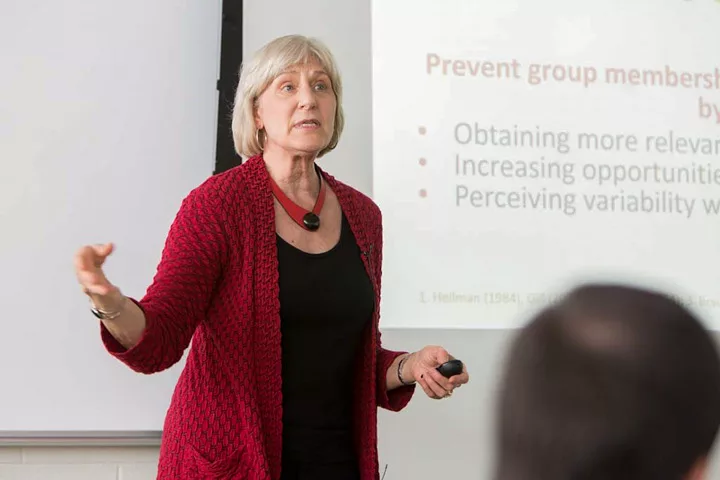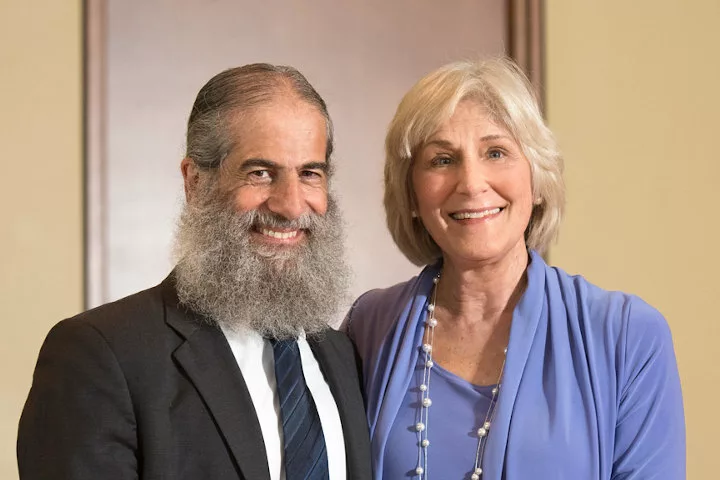Christopher ‘Rufus’ Sweeney Thinks Outside the Box in His Training and Career
Sweeney, known as a creative soul and prolific idea generator, says he inherited his entrepreneurial spirit from his paternal grandfather.
As a University of Michigan freshman who excelled in math and science, Molly Carnes, MD, MS ’01 (PG ’81), recalls her father encouraging her to become a doctor.
She reflects, “There’s such power in being told by a parent — in particular, for a girl to be told by her father — ‘you’re smart and you work hard.’”
Carnes earned her medical degree at the State University of New York at Buffalo and made it her life’s work to be a champion for the advancement of women and other talented individuals who have historically been underrepresented in medicine.
After completing her internal medicine residency at University of Wisconsin Hospital and Clinics (now UW Health) her fellowship in geriatrics and gerontology there was the perfect launch pad.
“Geriatrics was a new subspecialty at the time. It combined the best of everything,” says Carnes, now the Virginia Valian Professor in the Department of Medicine, Division of Geriatrics and Gerontology, at the UW School of Medicine and Public Health (SMPH); until early-2020, she also maintained a clinical practice at the William S. Middleton Memorial Veterans Hospital (VA).

“When I started my training, the phrase ‘social determinants of health’ hadn’t been used yet, but you have so many complex scenarios in geriatrics that it was like a team sport. We were working with nurses, pharmacists, social workers, occupational therapists and more, and I loved that,” says Carnes, who also holds faculty positions in the SMPH Department of Psychiatry and the UW School of Engineering’s Department of Industrial and Systems Engineering.
Early on, she discovered a talent for writing grants and developing programs, including The Geriatric Research, Education and Clinical Research Center (GRECC). Part of the Division of Geriatrics and Gerontology, GRECC is home to many internationally renowned research programs on aging, Alzheimer’s disease and older women’s health.
Carnes hadn’t formally studied gender issues, but she was a keen observer: Why were there so few women in leadership? Why were such talented women not being encouraged to pursue research careers or join the faculty?
The stage was set for Carnes to chart a new course. The VA recognized that 15 percent of active members of the U.S. Military were women, and it needed to make women’s health a priority. At the same time, the National Institutes of Health (NIH) established the Office of Women’s Health and the Office on Research of Women’s Health.
Carnes recalls thinking, while she was reviewing grants for a fellowship in women’s health at the VA, “I am in the perfect place to capitalize on this because geriatrics is essentially older women’s health. Overnight, I rebranded myself from a geriatrician to an internist focusing on older women’s health.”
Upon earning an NIH Mid-Career Academic Leadership Award (K07), she developed research and education programs in older women’s health and pursued a master’s degree in epidemiology at the SMPH. She also pulled together a group of tenured female health sciences faculty members to discuss how women’s health research and education could be strategically used as a way to bring more women into academic careers. With UW Hospital and Clinics, Meriter Hospital and the VA Hospital as clinical partners and several of UW–Madison’s schools and colleges as academic partners (including the SMPH, School of Nursing, School of Pharmacy and School of Veterinary Medicine), Carnes and colleagues founded the UW Center for Women’s Health Research in 1999 as one of just 12 federally funded National Centers of Excellence in Women’s Health Research.
As the local center’s director, she developed a strong network of women across campus who, like her, were investigating gender bias in science, technology, engineering and math (STEM). When the National Science Foundation introduced its ADVANCE Program to increase participation of women in STEM careers, Carnes added another “M” for medicine and applied for a $3.75 million grant with a co-principal investigator, Jo Handelsman, PhD, who now is the director of the Wisconsin Institutes for Discovery at UW–Madison, as well as a professor in the UW College of Agricultural and Life Sciences. In 2002, upon helping to create the Women in Science and Engineering Leadership Institute® (WISELI), Carnes’ work took another turn.
As WISELI co-director, she began to focus on organizational change and went deep into experimental social science research, which was generally absent from medical education.
WISELI launched a longitudinal, campuswide study led by Jennifer Sheridan, PhD, to measure faculty attitudes about department climate, hiring and promotion processes, and job satisfaction. Study data show a persistent gap for women and for faculty members of color compared to faculty from majority groups across UW–Madison. Data also show that faculty were more productive and had more publications in departments with a more positive climate.
WISELI leaders attacked gender issues with rigorous research methods and published their work in scientific journals. They conducted a systematic review of experimental interventions to reduce gender bias in hiring. Led by WISELI researcher Eve Fine, PhD, they also created and gave workshops to promote hiring excellent and diverse faculty. With NIH funding and with collaborators from several departments including Patricia Devine, PhD, from the Department of Psychology, Carnes conducted a study of a bias habit-reducing workshop in 46 departments, with another 46 departments as a control group.
Faculty in departments that received the workshops reported more positive climate, and these departments had greater gender and racial/ethnic diversity among their new hires two to three years later.
“I knew the coin of the realm, you had to come with research, and now here’s the data,” says Carnes. “This was Level 1 evidence, so we got attention. The reviewers were harsh, and at first it was almost impossible to get anything published. But, we did publish, and we wrote every grant we could to get funds to support this research. The movement gained traction. Now you can hardly pick up a journal without seeing something about gender.”
Today, the Department of Medicine has 27 tenured women on its faculty.
“And it’s not just the numbers,” Carnes notes with pride. “It’s that they are changing the culture, making the microenvironment more supportive and inclusive.”
Though best known for her work addressing gender bias, she says, “As white women, we were the first to get our toes in the door, and now 50 percent of medical students are women. From the beginning, we said it is our responsibility to bring our sisters of color with us.”
That means changing the attitudes and behaviors of those who shape department culture. With funding from the NIH, she is working with faculty in 19 departments of internal medicine across the United States to become bias-literate and use evidence-based strategies to “break the bias habit” through the Bias Reduction in Internal Medicine (BRIM) Initiative. Although Carnes worries that the pandemic will impact the ability to effectively measure climate change, BRIM has trained hundreds of people throughout the nation, from Johns Hopkins and Boston University on the east coast to the University of Washington.
But when asked about her greatest accomplishment, Carnes quickly answers, “My kids! They are amazing. Raising them is the best thing I ever did for gender or race equity!”

With the exception of her son, Paul Vogelman, who works in business, an interest in medicine runs in the family. Her daughter, Lindsey Vogelman, is a nurse and assistant manager of the VA’s community living center. And Carnes’ husband, Bennett Vogelman, MD (PG ’81, ’85) — as a professor in the SMPH Department of Medicine’s Division of Infectious Disease and vice chair for education in that department — directed the Internal Medicine Residency Program for 31 years, making him one of the longest-serving residency program directors in the nation.
“A born educator” as Carnes describes him, Vogelman retired in August 2020 to become a full-time kindergarten and preschool teacher for their three grandchildren, who are attending school virtually during the COVID-19 pandemic. Vogelman chimes in, “I’m also here to support Molly’s career. That’s always been a priority.”
Carnes — an expressive lecturer who speaks with her hands — has found it challenging to fit into the small-screen, virtual environment during the pandemic.
Even so, she says, “We adapt,” adding that she does not want her challenge with small spaces to prevent others from having room to grow.